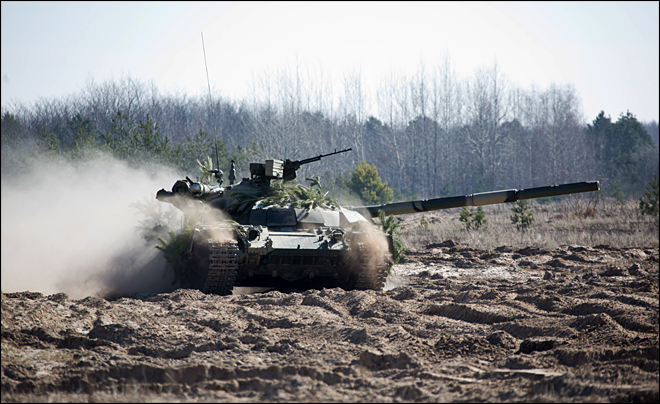
Ukraine Seeks Closer Ties With NATO and Its Member Countries
Ukraine Seeks Closer Ties With NATO and Its Member Countries
On April 1–2 in Brussels, the Ukraine-NATO Commission held a ministerial-level meeting to discuss the conflict with pronounced military dimensions between Russia and Ukraine (UNIAN, April 2).
Members of the North Atlantic Treaty Organization, however, would not use the term Russia-Ukraine conflict. Similarly, they have long eschewed acknowledging the reality of the Russia-Moldova and Russia-Georgia conflicts. Using those terms would implicate Russia as the aggressor power, with troops occupying parts of Ukraine’s, Moldova’s and Georgia’s internationally recognized sovereign territories. Yet, given these occupations’ protracted nature, and NATO’s recusal from crisis management in these areas, the Alliance avoids using terminology that would even implicitly identify Russia as the aggressor party to these conflicts. Holding Russia politically responsible for these acts would make it difficult to resume cooperation with Russia after a decent interval (e.g., barely one year after Russia’s 2008 invasion of Georgia).
Ukrainian Foreign Affairs Minister Andriy Deshchytsya requested the Allies in Brussels to deliver truck-mobile radars and other equipment items for the surveillance and protection of Ukraine’s borders. Deshchytsya presented the list during the Ukraine-NATO Commission meeting. Any decisions to deliver such equipment, however, are not collective NATO decisions, but would be up to member countries individually.
The Commission agreed on a list of activities for the near, medium and long terms, aiming to restore the Ukrainian military’s defensive capabilities and combat readiness. As an immediate priority, the session approved measures to assist Ukraine with the protection of critical infrastructure installations (Ukrinform, April 2).
Despite Russia’s occupation of Crimea and ongoing troop movements along Ukraine’s land borders, Ukraine is set to host the annual military exercises with the participation of NATO countries on Ukraine’s territory. In deference to Ukraine’s “non-bloc” status, exercises on its territory are not held under the aegis of NATO as such, but rather as multinational exercises involving the United States, European NATO members, and some non-NATO countries’ troops,
On April 1, the Verkhovna Rada (national parliament) approved the necessary legislation authorizing troops of foreign states to enter Ukraine’s territory and hold exercises during 2014. Eight exercises are scheduled to be held from May through October, involving 2,500 foreign and 2,500 Ukrainian troops, as follows (Ukrinform, April 1):
• US-led, multinational ground troops’ exercise “Rapid Trident,” at the Yavoriv base in Lviv region;
• US-Ukrainian “Sea Breeze” naval exercise, in the north-western Black Sea (Russia captured most of Ukraine’s Black Sea Fleet in March, with few exceptions, including the flagship Hetman Sahaydachny);
• Polish-Ukrainian “Safe Sky” exercise of air force squadrons, at the Myrhorod air base (Poltava region);
• Slovakian-Hungarian-Romanian-Ukrainian “Light Avalanche” exercise for military engineer units, to be held in Ukraine’s Carpathian region;
• Polish-Hungarian-Ukrainian exercise “Carpathians 2014” for mountain troops, also in that region;
• Romanian-Ukrainian-Moldovan exercise “South” for mechanized units, in the Odessa region;
• and Polish-Ukrainian exercise “Law and Order” for military police, to be held in the Mykolayiv region.
These exercises are less ambitious, in their scope and scenarios, from the versions of the same exercises that Ukraine hosted during Leonid Kuchma’s presidency. The “Peace Shield” and “Cossack Steppe” exercises have disappeared altogether. Nevertheless, with the Russia-Ukraine conflict still in an acute phase, the value of holding these exercises in Ukraine cannot be overestimated.
Ukrainian politicians are openly discussing various scenarios of cooperation with Western powers for alleviating Ukraine’s military vulnerability vis-à-vis Russia. In the Verkhovna Rada, the former minister of foreign affairs Borys Tarasiuk and colleagues from the Fatherland (Batkivshchyna) party have submitted legislation that would reinstate the goal of joining NATO as a centerpiece of Ukraine’s national strategy (see EDM, March 10, 12). Such legislation aims in effect to supersede Ukraine’s existing, unilaterally proclaimed, and unguaranteed non-bloc status, which failed to protect Ukraine from Russia’s depredations even before the seizure of Crimea. Fatherland is the most influential party in the current government; Tarasyuk is a convinced Atlanticist; while the party’s leading figure, Yulia Tymoshenko, and the current prime minister, Arseniy Yatseniuk, were co-signers of Ukraine’s application for a NATO Membership Action Plan in 2008. NATO turned down the MAP at the Bucharest summit but made an open-ended commitment that “Ukraine will be a member of NATO” (https://www.nato.int/cps/en/natolive/official_texts_8443.htm).
Other Ukrainian politicians are looking for creative ways to activate the 1994 Budapest Memorandum. Presidential front-runner candidate Petro Poroshenko and Svoboda Party leader Oleh Tyahnybok have, separately, proposed that Ukraine should approach the United States and the United Kingdom with requests to fulfill their part of the deal codified in the Budapest document. Though understood that the Memorandum “guaranteed” nothing, it did nonetheless clearly imply a US and British quid-pro-quo for Ukraine’s renunciation of its nuclear arsenal and resulting vulnerability vis-à-vis Russia. That quid-pro-quo could take the form of bilateral agreements for military assistance to Ukraine (UNIAN, Ukrinform, April 2).
The upcoming military exercises (see above) will most likely proceed irrespective of Ukraine’s presidential election campaign and the outcome of the May 25 election. The incumbent cabinet of ministers, however, is widely considered to be transitional. Any agreements for military and security cooperation with Western countries would probably have to await the formation of a more stable coalition government in Kyiv.


